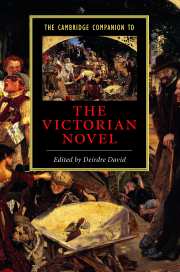Book contents
- Frontmatter
- Introduction
- 1 The Victorian novel and its readers
- 2 The business of Victorian publishing
- 3 The aesthetics of the Victorian novel: form, subjectivity, ideology
- 4 Industrial culture and the Victorian novel
- 5 Gender and the Victorian novel
- 6 Sexuality in the Victorian novel
- 7 Race and the Victorian novel
- 8 Detection in the Victorian novel
- 9 Sensation and the fantastic in the Victorian novel
- 10 Intellectual debate in the Victorian novel: religion, science, and the professional
- 11 Dickens, Melville, and a tale of two countries
- Guide to further reading
- Index
5 - Gender and the Victorian novel
Published online by Cambridge University Press: 28 May 2006
- Frontmatter
- Introduction
- 1 The Victorian novel and its readers
- 2 The business of Victorian publishing
- 3 The aesthetics of the Victorian novel: form, subjectivity, ideology
- 4 Industrial culture and the Victorian novel
- 5 Gender and the Victorian novel
- 6 Sexuality in the Victorian novel
- 7 Race and the Victorian novel
- 8 Detection in the Victorian novel
- 9 Sensation and the fantastic in the Victorian novel
- 10 Intellectual debate in the Victorian novel: religion, science, and the professional
- 11 Dickens, Melville, and a tale of two countries
- Guide to further reading
- Index
Summary
The impact and tenacity of the argument launched in Thomas Malthus's famous Essay on the Principle of Population (1798) can mean only one thing: the nineteenth century opened onto a very different field of narrative possibilities than had preoccupied and entertained the previous century, possibilities in terms of which Victorian authors and readers would imagine their lives, write their novels, and hammer out domestic and colonial policy. Although infant mortality rates had changed little for most of the people and would not improve significantly throughout the nineteenth century, the English population was growing younger. Compounded by the fact that no bouts of plague, famine, or other natural disasters had limited the growth of the population, people were marrying at a younger age. Marry a man with whom you were emotionally compatible if you could, but marry a man of material means you must, such novels as Pride and Prejudice (1813) and Emma (1816) seemed to say, or else face the degradation of impoverishment or, worse, the need to work for a living. Given that the population under twenty-five years of age shot up from 46 to 58 percent of the population between the mid-eighteenth century and the beginning of Victoria's reign in 1837, courtship rituals to ensure that deserving women would meet and win the hearts of eligible men could not have been considered a frivolous activity. Nor could knowledge of the social rituals of the sort that fill Austen's pages be distinguished from the political power of a group of men and women who were neither aristocratic nor forced to work for a living. The delicate nuances of feeling and elaborate rituals that gave those feelings both vigor and charm not only consolidated this group but also contained the secret of its perpetuation.
- Type
- Chapter
- Information
- The Cambridge Companion to the Victorian Novel , pp. 97 - 124Publisher: Cambridge University PressPrint publication year: 2000
- 1
- Cited by

